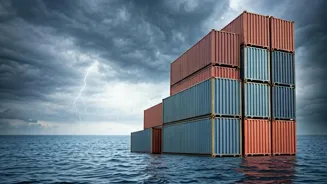Global Trade Challenges
Minister Jaishankar brought attention to the potential difficulties in global trade, stressing how geopolitical tensions and variable tariffs may disrupt
the smooth flow of goods and services across borders. He noted that the environment of global trade is influenced significantly by international relations, as well as the policies of various nations. These aspects can lead to uncertainty and pose risks for countries involved in trade. Specifically, changes in tariffs, whether due to economic strategies or political considerations, can abruptly increase expenses for businesses. This volatility creates instability, and makes it harder for companies to budget, forecast, and maintain their international operations. To mitigate these difficulties, Jaishankar called for more open communication and cooperation between nations. A unified front could help stabilize the trading environment and lessen the negative effects of the global economy on businesses. The necessity of multilateralism to resolve trade issues was also underlined by the minister. This method promotes shared responsibility, allowing countries to discuss and deal with issues cooperatively rather than individually, thereby assisting in the overall stability of trade.
Geopolitical Shifts Impact
The External Affairs Minister also discussed how geopolitical changes can greatly affect global trade. Shifting alliances, emerging conflicts, and strategic decisions have a direct impact on the path and conditions of trade. Political instability in any part of the world can immediately affect trade routes and supply chains. For example, the imposition of trade restrictions or sanctions between countries can completely disrupt established trading connections, leading to significant financial consequences for all affected parties. Furthermore, geopolitical tensions frequently lead to increased protectionist actions. Countries could opt to prioritize domestic industries by raising tariffs and barriers to trade, which could, in turn, reduce the overall volume of international trade. These types of maneuvers can exacerbate volatility, as nations seek to protect their own economic interests. Therefore, according to Jaishankar, it is very important that nations work together to deal with these geopolitical difficulties and develop strategies to lessen trade disruptions. These strategies could involve establishing alternative trade routes, negotiating trade agreements, and developing coordinated policies to ensure that businesses can navigate international markets without unnecessary obstacles.
Tariff Volatility Concerns
Jaishankar emphasized that the fluctuating nature of tariffs is a serious concern for the global economy. Tariffs are taxes on imports and exports, and they play a crucial part in trade. When tariffs are inconsistent or constantly changing, it creates uncertainty for businesses, and makes it hard for them to plan and make financial commitments. Sudden increases in tariffs can make imported products more expensive, which could hurt consumer demand and reduce trade volumes. On the other hand, decreases in tariffs might create sudden market changes and pressure on local industries. This volatility can destabilize supply chains, as companies find it hard to rely on predictable access to materials or finished goods. The minister highlighted the need for more predictable and stable tariff policies worldwide. Having well-defined and stable tariffs helps businesses, which improves international trade and strengthens economic relations. Additionally, predictability encourages investment and growth by reducing the risk associated with international trade. This is a key factor in global economic stability, and ensures countries can grow and share prosperity through more open markets.
Need for Collaboration
To tackle the challenges posed by geopolitical shifts and tariff volatility, Jaishankar underscored the importance of international cooperation. He advocated for nations working together to create a stable and predictable environment for global trade. This cooperation is essential to building global resilience and mitigating the adverse effects of global economic uncertainties. Jaishankar believes that collaboration involves sharing knowledge, coordinating policies, and establishing forums for dialogue. He suggested that nations should actively participate in international organizations, such as the World Trade Organization, to discuss trade-related issues and establish guidelines. These forums allow nations to resolve conflicts and develop policies that support fair trade practices. Additionally, the minister highlighted the importance of multilateralism, where countries work together to handle issues instead of acting alone. Multilateral approaches improve trade relations and ensure stability. Furthermore, he emphasized the value of inclusive trade agreements that take into account the needs of all nations. This collaboration will assist in creating a more stable and resilient global economy, and promote prosperity for all.
India's Commitment
Minister Jaishankar’s remarks serve as a reflection of India's commitment to safeguard its economic interests in an era of global uncertainty. With a growing economy and increasingly integrated role in world trade, India is greatly concerned about the effects of trade disruptions. The nation is committed to ensuring that international markets remain open, stable, and predictable. India actively pursues various strategies to achieve these goals. It actively participates in trade negotiations, both bilaterally and multilaterally, to secure favorable trade terms and reduce trade barriers. It also establishes relationships with various partner countries to diversify its trade relationships, thereby reducing its vulnerability to disruptions in any single market. Additionally, India continues to promote policies that support the competitiveness of its industries. By doing so, India aims to ensure that its businesses remain competitive in global markets and that it can benefit from international trade. In this regard, India is committed to a rules-based global order, and supports efforts to reinforce international cooperation and uphold the principles of fairness and transparency in trade.















